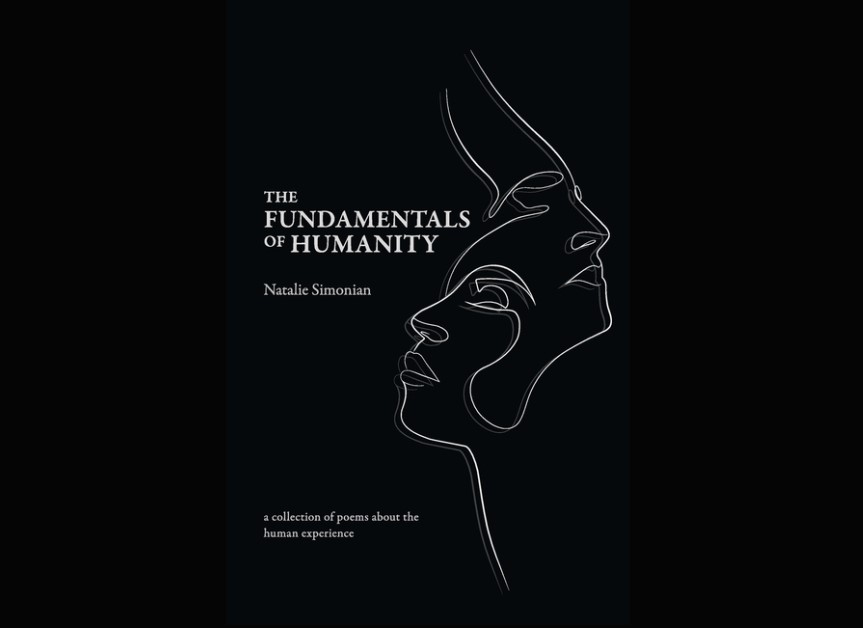Natalie Simonian, author of The Fundamentals of Humanity, is a 24-year-old Armenian-Canadian and graduate student at the University of Toronto. Simonian is studying liver disease by day — by night, she writes poetry about the human experience.
Over the course of her undergraduate degree at the University of Toronto, she felt a plethora of emotions. She began writing to process how she was feeling and found a safe space in poetry. The Fundamentals of Humanity is a four-part compilation of the human experience as felt by a young female student navigating the world.
Natalie writes to communicate her thoughts and feelings that are deemed “vulnerable.” Her hope is that if people read her work, and resonate with it, then they too will become okay with vulnerability.
In the beginning, she wrote primarily for herself, to cope with mental health challenges she faced as an undergrad. Gradually, she began to share her work on places such as Instagram, where she realized that many people also dealt with mental health struggles. As a second-year master’s student studying liver transplant readmissions, Simonian finds that writing is her mental break and her incentive to keep working through her dissertation.
Her stream-of-consciousness style poetry touches not only on mental health, but on life, what it means to grow up, and what it means to be human. To Simonian, writing poetry, and subsequently publishing The Fundamentals of Humanity, with the help of Tali from the Soapbox Press and Plume press, was a way of embracing vulnerability, practicing presence, processing life, and letting go.
Through her writing she set out to create space for herself and others to find connection within the fundamentally human feelings we all experience.

When asked why it is so important to be vulnerable and talk about mental health, Simonian says, “It’s important to put a name to it. Not necessarily labelling yourself, but naming it so that you don’t feel alone and you’re not sitting, simmering in it, or grappling with it. Just from my personal experience, before I fully coped with my issues, I was operating at 20 per cent, maybe 10 per cent, of my capacity — it was exhausting.
“Before I started talking about it, I was thinking ‘well, I’m in university, it’s like this, everyone feels like this.’ And it’s true, a lot of people do, but that’s not being human. Just functioning is not living.”
These feelings are a part of what fuels her writing.
When asked what inspires her poetry, Simonian says, “I used to, as most teens and adolescents did, write journals and diaries. With poetry, I felt that it was a space where you could communicate those feelings without being so obvious. You’re not writing about people anymore, you’re not writing about places anymore, it feels timeless.”
Poetry became the natural evolution of her journaling, as it became a space that allowed her to explore life without being confined by it.
“At its core, poetry is the ultimate form of self-expression,” Simonian shares. “I want people to see vulnerability is okay and embrace it. They can talk about it too. I’m a very private person, I don’t like sharing everything about my life, but I try to be as vulnerable as I feel is right.”
“The Fundamentals of Humanity is loosely based on me,” she continues. “It’s exactly how I was feeling in undergrad, especially coming to terms with anxiety and OCD.”
Writing poetry became a part of Simonian’s journey towards accepting, understanding, and learning to cope with her mental health challenges.
“Anything related to mental health is a practice,” she says. “There are days when I’m 100 per cent, I’m happy in the present. Then, there are days I wake up with anxiety. I have to remind myself, ‘ground yourself, you’re here, it’s not a bad day, get started, do your work, take a walk.’ Some days it comes naturally. Other days I have to force myself.”
For Simonian, writing her book and illustrating the interior of it became a practice of being present and letting go. “The drawings weren’t coming out exactly the way I would want,” she says. “That’s the whole point of this book. It’s not perfect, because life isn’t perfect.”
Simonian’s advice on life, poetry, and writing is, “don’t overthink it.” She emphasizes the importance of just getting started, doing it prior to any polishing, and seeing what your creativity or emotions allow you to produce.
To see more of Simonian’s work, she can be found on Instagram @FundamentalsofHumanity


